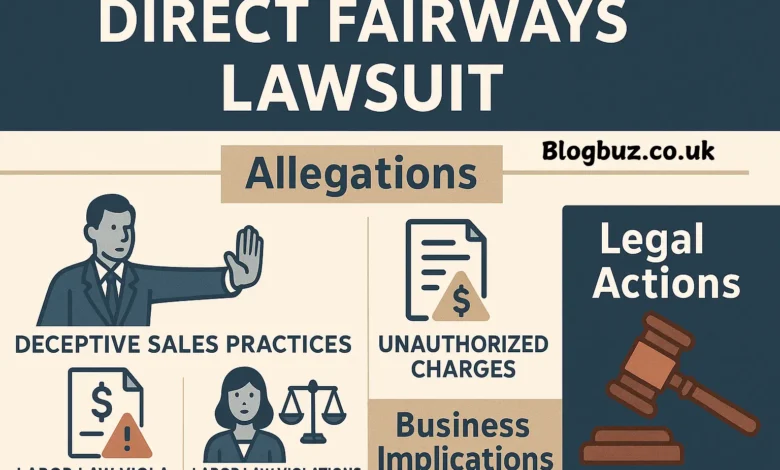Direct Fairways Lawsuit: Allegations, Legal Actions, and Business Implications

In recent years, the marketing and advertising industry has come under increased scrutiny, especially in cases involving alleged deceptive business practices. One case that has caught the attention of small businesses and legal experts alike is the Direct Fairways lawsuit. Direct Fairways LLC, a company based in Tempe, Arizona, has faced multiple allegations of fraudulent advertising tactics, unauthorized charges, and labor law violations. This article explores the full scope of the lawsuit, the key players involved, the allegations brought forward, and the broader implications for businesses and consumers.
Who is Direct Fairways?
Direct Fairways is a marketing and advertising company primarily targeting small and medium-sized businesses with advertising opportunities at golf courses across the United States. The company sells ad space on golf course materials such as yardage books, scorecards, tee signs, and ball washers. These promotional items are purportedly distributed at partnered golf courses, offering advertisers local exposure to affluent golfing demographics.
The Rise and Controversy of Direct Fairways
As Direct Fairways expanded, the company initially built momentum by offering a specialized marketing service that linked local businesses with golfers at participating courses. Over time, however, the company began facing growing criticism and legal challenges. A number of advertisers and former employees reported concerns about questionable business practices, leading to intensified scrutiny. These accumulating allegations eventually contributed to the development of what is now widely referred to as the Direct Fairways lawsuit. For readers exploring similar industry issues, insights such as those found in the MotoAssure BBB overview may also be helpful.
Key Allegations in the Direct Fairways Lawsuit
- Deceptive Sales Practices One of the most common complaints against Direct Fairways is that the company used misleading sales tactics. Many small business owners allege they were promised prominent ad placements at specific golf courses, only to discover later that the courses had no affiliation with Direct Fairways or that their ads were never displayed.
- Unauthorized Charges and Billing Issues: Several businesses have reported unauthorized charges on their accounts. Clients claimed they agreed to one-time payments but were subjected to recurring billing without consent. Some also reported difficulty in obtaining refunds or even reaching customer service.
- False Representations and Misleading Contracts. According to multiple complaints, the sales representatives allegedly exaggerated the reach and distribution of the promotional materials. Some clients were told that their ads would be featured at top-tier golf courses or in high-traffic areas, only to find that no such distribution occurred.
- Labor Law Violations: Former employees of Direct Fairways have come forward with claims that the company misclassified them as independent contractors rather than full-time employees. They argue that this classification denied them benefits, legal protections, and fair compensation under state and federal labor laws.
Legal Actions and Class-Action Lawsuits
Due to the mounting complaints, a class-action lawsuit was filed in 2022 by a coalition of affected businesses and former employees. The plaintiffs allege that Direct Fairways engaged in deceptive business practices and violated labor laws. The lawsuit seeks financial restitution, policy changes within the company, and stronger regulatory oversight of such marketing firms.
The legal action has drawn the attention of consumer advocacy groups and state authorities, including the Arizona Attorney General’s office. The Better Business Bureau (BBB) has also recorded many complaints, leading to a low rating for the company on its platform.
Company Response to the Allegations
Direct Fairways has denied any wrongdoing, stating that any misunderstandings were due to miscommunication or isolated incidents. The company asserts that it provides a valuable service and has a track record of successful campaigns. Sometimes, the company has issued refunds or credited accounts to resolve disputes.
Regarding labor law claims, the company maintains that its contractors were fully informed of their employment status and agreed to the terms upon hiring. Despite these claims, the controversy has significantly damaged the company’s reputation.
Implications for Small Businesses
The Direct Fairways lawsuit is a cautionary tale for small businesses considering advertising partnerships. Many small business owners operate on tight marketing budgets and cannot afford to lose money on ineffective or fraudulent advertising. Here are several lessons to be learned:
- Vet Your Advertising Partners Before signing contracts or making payments, businesses should thoroughly research the advertising company. Look for reviews, BBB ratings, and any pending lawsuits or complaints.
- Request Proof of Distribution. Always verify that your advertisements will be placed and distributed as promised. Ask for a list of golf courses or venues where your ads will appear, and contact those venues to confirm.
- Review Contracts Carefully. Ensure that all terms, especially regarding billing and cancellation policies, are explicitly outlined in the contract. Avoid verbal agreements and insist on written documentation.
- Be Aware of Red Flags. High-pressure sales tactics, a lack of transparency, and difficulty reaching customer service are all red flags that a business may not be legitimate.
Regulatory and Industry Responses
In light of the Direct Fairways lawsuit, regulatory bodies are under growing pressure to introduce stricter oversight in the advertising industry. Consumer advocacy groups call for enhanced protections for small businesses and more precise guidelines for marketing practices.
The case has also prompted other golf course advertising firms to review their policies and improve transparency with clients. Industry associations are beginning to establish ethical standards to prevent similar incidents.
Conclusion
The Direct Fairways lawsuit underscores the importance of advertising transparency, accountability, and consumer protection. While Direct Fairways continues to deny the allegations, the volume and consistency of the complaints suggest systemic issues within the company. This case is a stark reminder for small business owners to exercise due diligence when choosing marketing partners.
As legal proceedings continue, the outcome of this case could set important precedents for how deceptive marketing practices are handled in the future. Whether you are a business owner, a marketer, or a consumer, staying informed and vigilant is the best defense against falling victim to similar schemes.
You May Also Read: West Valley City Mesothelioma Lawyer Vimeo: Finding the Right Legal Support




